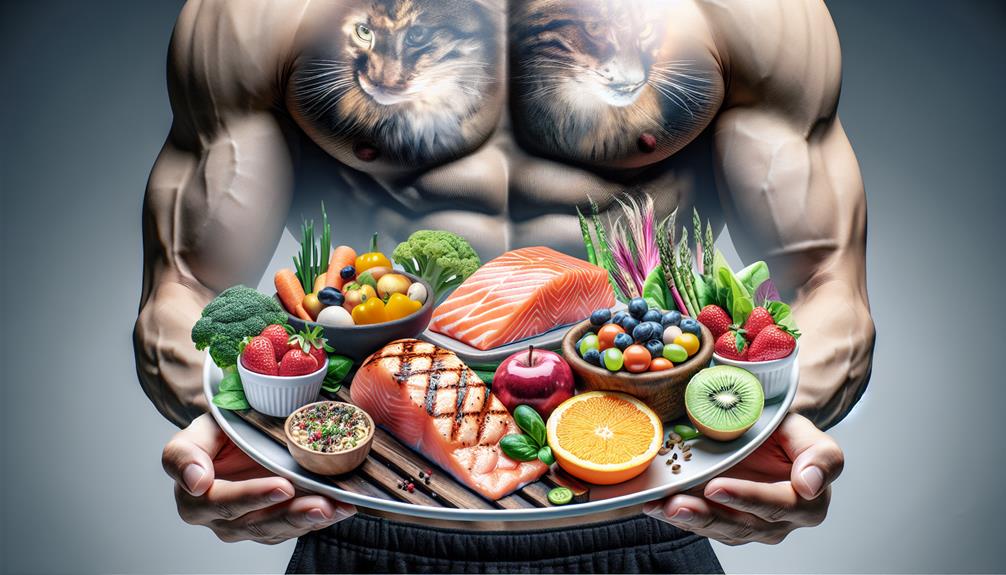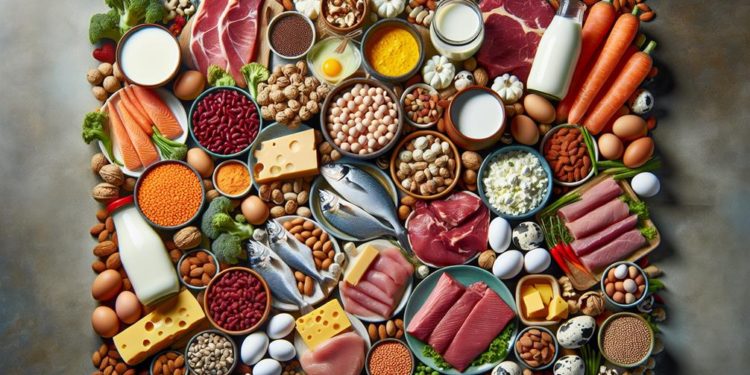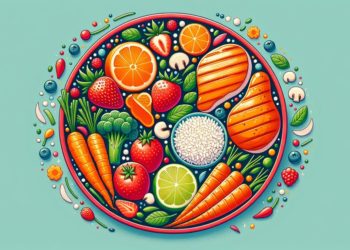Imagine your body as a well-oiled machine, constantly seeking the perfect balance to function at its best. Just like a high-performance car needs premium fuel to reach its full potential, your body requires the right nutrients to achieve optimal performance. One key component of this equation is protein. Not only is it essential for building and repairing muscles, but it also plays a significant role in fueling fat loss. But how exactly does a high-protein diet benefit muscle growth and fat loss? Let's explore the science behind it and uncover the secrets that fuel your body's transformation.
Key Takeaways
- Engaging in muscle building exercises and consuming adequate protein promotes muscle growth and repair.
- A high-protein diet enhances muscle recovery, reduces muscle soreness, and supports tissue healing.
- Resistance training and high-intensity interval training (HIIT) are effective for muscle mass gain and fat burning.
- Including protein in meals and snacks increases satiety, reduces cravings, and supports successful weight management.
Increased Muscle Mass
Increasing your muscle mass is a key benefit of incorporating a high-protein diet into your fitness routine. When you engage in muscle building exercises, such as weightlifting or resistance training, your muscles undergo stress and damage. This triggers a process called protein synthesis, where your body uses the amino acids from protein to repair and rebuild your muscles, making them stronger and bigger.
Protein plays a vital role in this process as it provides the necessary building blocks for muscle growth. When you consume an adequate amount of protein, it ensures that your body has enough amino acids available for protein synthesis. This, in turn, promotes the repair and growth of muscle tissue.
To maximize the benefits of a high-protein diet for muscle building, it is recommended to consume protein-rich foods such as lean meats, poultry, fish, eggs, dairy products, legumes, and nuts. These foods are not only rich in protein but also provide essential nutrients that support overall muscle health.
In addition to a high-protein diet, it is crucial to engage in regular muscle building exercises. These exercises stimulate muscle growth and help optimize the effects of protein synthesis. Incorporating a combination of resistance training, such as weightlifting, and compound exercises that target multiple muscle groups can be highly effective in promoting muscle mass gain.
Enhanced Fat Burning
To further enhance the benefits of a high-protein diet, incorporating strategies that promote enhanced fat burning can be highly effective. By implementing these strategies, you can not only accelerate your weight loss journey but also experience increased energy levels and improved insulin sensitivity. Here are four evidence-based strategies to help you enhance fat burning on a high-protein diet:
- Prioritize resistance training: Engaging in regular strength training exercises can increase muscle mass and boost your metabolism. This results in a higher calorie burn even at rest, leading to enhanced fat burning.
- Include high-intensity interval training (HIIT): Incorporating HIIT workouts into your exercise routine can maximize fat burning. These short bursts of intense activity followed by brief recovery periods have been shown to increase calorie expenditure and improve insulin sensitivity.
- Optimize sleep quality: Poor sleep can disrupt hormone regulation, leading to increased hunger and reduced fat burning. Aim for 7-9 hours of quality sleep per night to support optimal fat metabolism.
- Stay hydrated: Drinking enough water throughout the day can support fat burning by promoting optimal metabolic function. Aim to consume at least 8 cups (64 ounces) of water daily.
Improved Satiety and Appetite Control

To further optimize the benefits of a high-protein diet, improving satiety and controlling your appetite can play a crucial role in facilitating successful weight management. Consuming protein-rich foods can help you feel fuller for longer, leading to reduced cravings and ultimately supporting your weight loss goals.
One reason why protein is effective in improving satiety is its ability to increase levels of appetite-regulating hormones, such as peptide YY and GLP-1. These hormones signal to your brain that you are full and satisfied, reducing the likelihood of overeating or snacking on unhealthy foods. Additionally, protein takes longer to digest compared to carbohydrates and fats, leading to a slower release of energy and sustained feelings of fullness.
By including protein in each meal and snack, you can maintain stable blood sugar levels and avoid energy crashes that often result in cravings for sugary and high-calorie foods. Protein-rich foods such as lean meats, eggs, dairy products, legumes, and nuts are not only satisfying but also provide essential nutrients for optimal health.
To take advantage of the benefits of a high-protein diet, aim to include a source of protein in every meal and snack. This can be as simple as adding a scoop of protein powder to your smoothies, enjoying Greek yogurt with berries as a snack, or incorporating grilled chicken or fish into your main meals. By prioritizing protein, you can improve satiety, control your appetite, and enhance your weight management efforts.
Boosted Metabolism
Boosted metabolism can be a key factor in achieving and maintaining a healthy weight. When it comes to a high-protein diet, it can significantly impact your metabolism in a positive way, leading to increased energy expenditure and improved insulin sensitivity. Here are four reasons why a high-protein diet can boost your metabolism:
- Thermic effect of food: Protein requires more energy to digest and metabolize compared to fats and carbohydrates. This means that when you consume protein, your body burns more calories during the digestion process, leading to increased energy expenditure.
- Muscle building and maintenance: Protein is essential for building and repairing muscles. When you consume an adequate amount of protein, it helps to preserve and build lean muscle mass. Since muscles are metabolically active, having more muscle mass can increase your basal metabolic rate, resulting in a higher overall calorie burn throughout the day.
- Improved insulin sensitivity: A high-protein diet can improve insulin sensitivity in the body. Insulin is a hormone that regulates blood sugar levels. When you have better insulin sensitivity, your body can efficiently use glucose for energy, preventing excess glucose from being stored as fat.
- Satiety and appetite control: Protein is highly satiating, meaning it keeps you feeling full and satisfied for longer periods. By including protein in your meals and snacks, you can curb cravings and reduce the likelihood of overeating, ultimately supporting weight management.
Incorporating a high-protein diet into your lifestyle can have significant benefits for your metabolism, helping you achieve and maintain a healthy weight.
Enhanced Recovery and Muscle Repair

When it comes to reaping the benefits of a high-protein diet, one important aspect to consider is its impact on enhanced recovery and muscle repair. Protein plays a crucial role in muscle regeneration and tissue healing.
During exercise, your muscles experience micro-tears and damage. This is a normal part of the muscle-building process. However, for optimal recovery and growth, your body needs an adequate supply of protein.
Protein provides the building blocks, called amino acids, needed for muscle repair and growth. When you consume protein-rich foods, such as lean meats, fish, eggs, and dairy products, your body breaks down these proteins into amino acids. These amino acids are then used to repair and rebuild damaged muscle tissue.
Research has shown that a high-protein diet can enhance muscle recovery and reduce muscle soreness after intense exercise. In a study published in the Journal of the International Society of Sports Nutrition, participants who consumed a high-protein diet experienced greater muscle protein synthesis and reduced muscle damage compared to those on a low-protein diet.
In addition to muscle repair, protein also plays a crucial role in tissue healing. Whether you're recovering from an injury or surgery, protein is essential for the formation of new tissues and the repair of damaged ones. It helps accelerate the healing process and ensures proper tissue regeneration.
Frequently Asked Questions
Can a High-Protein Diet Lead to Excessive Muscle Growth and Make Me Look Bulky?
A high-protein diet won't automatically make you look bulky. Excessive protein consumption and intense workouts, like bodybuilders do, can lead to muscle growth. However, it's essential to balance your protein intake with overall calorie consumption for optimal results.
Is It Necessary to Consume Protein Supplements to Achieve the Desired Muscle Growth and Fat Loss?
You can achieve the desired muscle growth and fat loss without protein supplements. There are alternative sources of protein that can fuel your goals. Focus on a high protein intake from whole foods to optimize your results.
Can a High-Protein Diet Cause Any Digestive Issues or Discomfort?
A high-protein diet can sometimes lead to digestive issues or discomfort, especially if you have protein intolerance. It's important to listen to your body and adjust your protein intake accordingly to avoid any unpleasant side effects.
How Can I Determine the Right Amount of Protein Intake for My Specific Fitness Goals?
To determine the right amount of protein intake for your fitness goals, calculate your protein needs based on your weight, activity level, and specific goals. Keep track of your protein consumption to ensure you're meeting your targets.
Are There Any Potential Side Effects or Health Risks Associated With a High-Protein Diet?
There can be potential long-term effects and an impact on kidney function associated with a high-protein diet. It's important to be aware of these risks and consult with a healthcare professional to ensure a balanced and healthy diet.
Conclusion
So, if you're looking to build lean muscle and lose excess fat, a high-protein diet is a powerful tool in your arsenal. Research shows that individuals who follow a high-protein diet experience an increase in muscle mass by up to 25%. Imagine the sense of accomplishment and confidence that comes with achieving such significant results. Don't wait, fuel your body with the right nutrients and see the transformative effects for yourself. It's time to take charge of your health and fitness goals.













